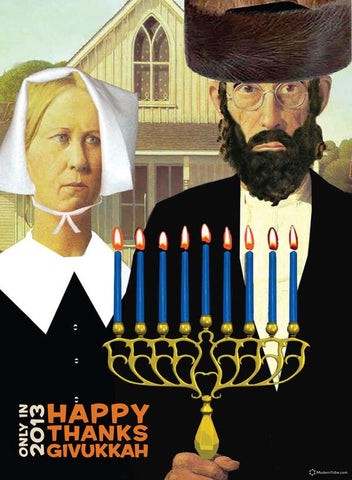Rabbi Mishael Zion | Bronfman Fellowships | Text and the City | Thanksgiving 2013
A once in a century
holiday is upon us. The menurkey will soon sit at the table with the pumpkin pie and
the latkes. Let us not underestimate this moment for the American Jewish
community. Thanksgivukkah is here.
 |
| Buzzfeed |
Jews have always loved Thanksgiving.
Now that their favorite American holiday finds itself face to face with
America’s favorite Jewish holiday – Hanukkah – the encounter can say an
enormous amount about the American Jewish collective story. In other words,
Thanksgivukkah tells us something important about what Jews are doing in
America.
It starts with good timing. When Hanukkah falls on Christmas,
it highlights Judaism as a religion, a fair contender on the scene of American
denominations. But Thanksgivukkah yanks the carpet from under the convenient
Christmas-Hanukkah dichotomy.
The Thanksgiving of today grew out of its religious roots.
The same could be said of the Judaism of many Americans. Thanksgiving is about
America, not in a celebration of patriotic triumphalism. It’s about America as
a promise, an idea, a project. If, any other year, most American Jews sideline
Judaism and celebrate Thanksgiving simply as Americans, this year’s calendar
demands owning up to the Jewish take on the American story.
In Thanksgivukkah this generation of Jews might just have
found their model holiday.
 Indeed, if there is an “American Project”, Jews have been
some of its most avid contributors. As narrators, critics, troubadours and
activists, they took care of themselves while making plenty of room for others.
To be sure, America is far from the only contemporary Jewish story. Jews have
not one, but two Promised Lands: Israel and America have become the yin and
yang of the Jewish people. As Hillel might have put it: “If I am not for myself
– who will be for me?” – such is the Israeli project. “And if I am only for
myself, what am I?” – the American Jewish project.
Indeed, if there is an “American Project”, Jews have been
some of its most avid contributors. As narrators, critics, troubadours and
activists, they took care of themselves while making plenty of room for others.
To be sure, America is far from the only contemporary Jewish story. Jews have
not one, but two Promised Lands: Israel and America have become the yin and
yang of the Jewish people. As Hillel might have put it: “If I am not for myself
– who will be for me?” – such is the Israeli project. “And if I am only for
myself, what am I?” – the American Jewish project.
“And if not now, when?”
Thanksgivukkah brings home some of the challenges of a Jewry
so invested in America. For the most part, American Judaism has failed at being
a homemade identity, outsourcing the task to synagogues, Hebrew schools, Bnai
Brith or AIPAC. Yet Hanukkah leaves the synagogues orphaned. With all due
respect to public square Menorahs, any halakhist will tell you it’s the Menorah
in the home that counts. Thanksgiving is the same: it is a homemade celebration
of Americanism; it convenes the family in a feast of gratitude. Pilgrimages by
air, track and road attest to the home’s centrality.
Thanksgiving is a much needed model for an increasingly
secular American Jewry. Where “cultural Judaism” is often “soft” and
“optional”, Thanksgiving has an undeniably “commanding” presence. Who doesn’t
come home for Thanksgiving, from wherever that may be? Who doesn’t have a
turkey at the table, even if it’s made of tofu? Thanksgiving is an unapologetic
model for a cultural identity being a commanding presence in one’s life.
But Hanukkah one-ups Thanksgiving - it turns family time into
story time. When asking where the Bible commanded us to light the Hanukkah
candles, the
Talmud responds: “We learn that we must light candles from the Biblical
verse: ‘Ask your father, he will tell you’.” The candles set the stage for a
story.
 |
| Buzzfeed's delicious Thanksgivukkah Table |
Yet in those rare moments where a family Thanksgiving allows
for a discussion, it is often of a “here and now” gratitude. Hanukkah’s
gratitude, on the other hand, is rooted. A Thanksgiving-style family meal with Hanukkah-style
stories ask us to place the individual narrative on a longer trajectory — why
did we come here, how did we achieve the things for which we are grateful, and
where do we - individuals, community and country - go from here. That is what
Thanksgivukkah should be. It should turn a generation of immediate
gratification into one of rooted gratitude. It’s not about religion or musty
history, but about the power of local
family stories. America and Judaism each face severe struggles adapting to
a flat world. Both are undermined by an increasingly divided base. They need
their stories more than ever. Ask your mother; she will tell you.
For an American Jewish community increasingly consisting of
families of both Jewish and non-Jewish members, Thanksgivukkah is a moment that
allows for a diversity of stories at the table. Hanukkah’s Jewish coat over
Thanksgiving’s American jersey throws us back to the vision of America as a
series of cultural pluralisms. Thanksgivukkah asks us to keep telling the
stories that go beyond America.
Thanksgivukkah is an invitation to celebrate the places where
Jewishness enriches America, and where America enriches the Jewish people. Jews
have always preferred stories to dogma and ritual to creed. This November
American Jews are invited to sit down at the Thanksgivukkah table and tell
stories of rooted gratitude. Let's make sure this happens more than just every
70,000 years. Happy Thanksgivukkah.
For further discussion of these ideas, including ideas for family Thanksgivukkah conversations, and links to other Thanksgivukkah resources, visit Text and the City.


